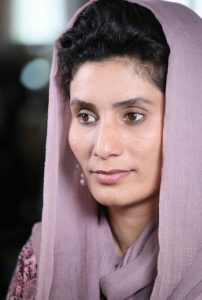Lack of Understanding Between Women in the Negotiating Team Can be Problematic

A number of women’s rights activists in Kapisa say the outcome of the talks will not be satisfactory if the women members of the negotiating team do not agree on issues to be discussed in the peace talks and how to raise them with the Taliban.
“Despite the skepticism about the outcome of the peace process; I hope the delegates are honest and move forward with the same points of view”, said Sarah Sirat, a women’s rights activist in Kapisa, in an interview with the CSHRN.
Criticizing the inequality of the number of male and female representatives in the negotiating team; some women activists say that because peace and war are believed by some to be masculine, women have a smaller share of the team, but Ms. Sirat believes that women have never been to war and they have been the common victims of the war. Ms. Sirat added, “Women have always lost their brothers, husbands, fathers and children, and they have suffered a lot psychologically and hence they should not stay in the minority in decisions that affect their destiny”.
According to Ms. Sirat, the absence of representatives of the media, civil society and victims of war in peace talks is seen and felt, and since some of these groups do not trust the transparency of this process, they have the right to be present and be informed of its content.
CSHRN: What problems do women face in Kapisa?
Sirat: One of the main problems for women in the province is insecurity, which sometimes causes girls and women to be forced to drop out of school and work; a problem that is more prevalent in Taliban-held districts.
According to Ms. Sirat, another part of women’s problems in Kapisa is related to job opportunities. She says, “Study opportunity is good here and one member from each family holds a bachelor’s degree at least, but there are very few job opportunities.” She adds that coercion and the dominance of relationships over norms have weakened women’s morale and deprived them of the right to work.
CSHRN: Do you have any specific experience in this regard?
Sirat: Yes. A woman was legally employed as a deputy director of education for a month, but the former person returned to his job through political lobbying. Although we sued for this woman, but it did not work. This situation also makes our lawsuits vulnerable.
According to the women’s rights activist, women living in the provinces have been given little share in government; leaving them without a chance to use their abilities. “In every program in the northern constituency; women have not played a significant role and their presence has been very low.”, she added.
CSHRN: What do Kapisa women want from the peace talks?
Sirat: One of their most important demands is that women in the provinces should not be marginalized. We still expect the outcome of these talks to be beneficial for the people.
According to Ms. Sirat, one of the main concerns of women rights activists is that after the peace talks, the conditions for their activities will not be favorable and the expected result of these talks will not be achieved. “We have always said that we are the silent voice of the majority; if our voice is silenced, the voice of the all the people will be silenced”, adds Ms. Sirat.
CSHRN: What is your suggestion for the negotiating team?
Sirat: As the Taliban have plans to amend the constitution, women on the negotiating team must do their utmost to preserve the second chapter of the Afghan constitution; the right to choose, work and study are the most important issues to be discussed. The important thing is to emphasize the political presence of women, if these issues are not discussed, women may be completely removed from the scene.
This women’s rights activist believes that women on the negotiating team should not see this as a privilege, but as a responsibility and the ability to do so in order to have an impact on the peace process.